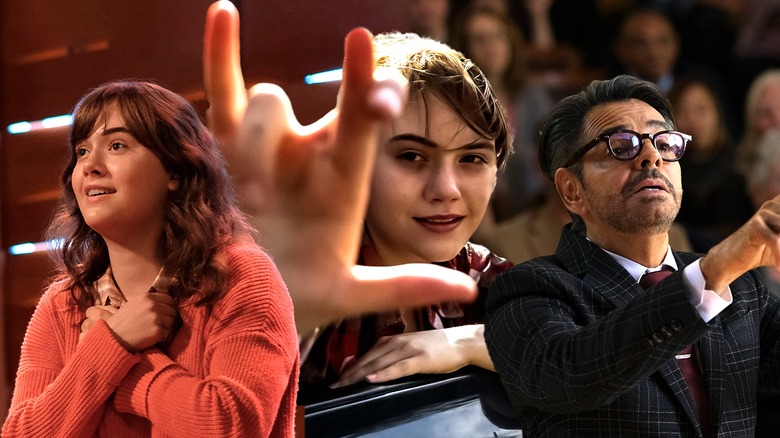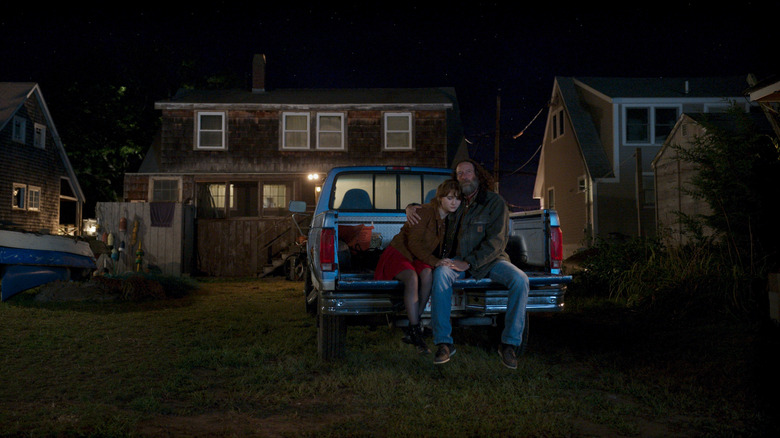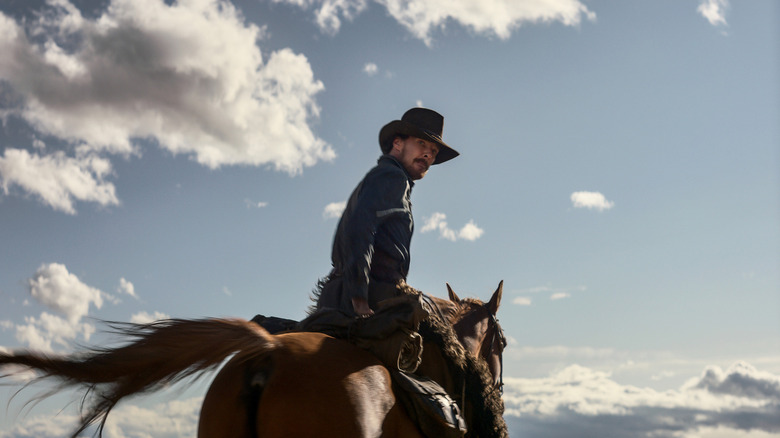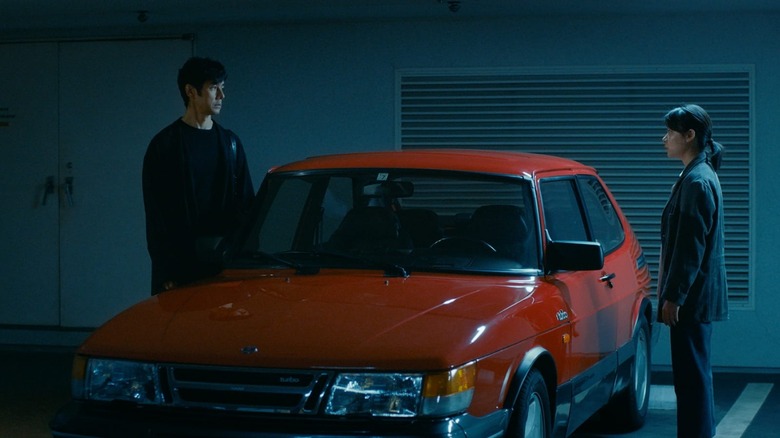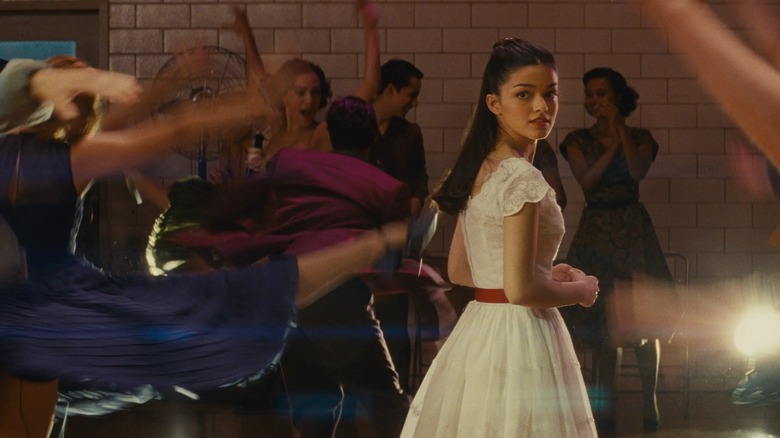One Year Later, How Do We Feel About CODA Winning Best Picture?
(Welcome to Did They Get It Right?, a series where we take a look at an Oscars category from yesteryear and examine whether the Academy's winner stands the test of time.)
With the boom of streaming over the last decade, it was only a matter of time before a streaming service was behind a best picture winner. Netflix tried their damnedest with titles by some of our most renowned filmmakers to earn Hollywood's biggest prize, such as Alfonso Cuarón's "Roma," Martin Scorsese's "The Irishman," and David Fincher's "Mank." All of them failed to nab it. If it wasn't going to be Netflix, then it was going to be Amazon, right? Nope. How about Hulu? Not a chance.
As it happened, the first film to win best picture from a streamer was from a service a lot of people aren't even sure if they have or know how to access, Apple TV+, and their champion wasn't from the mind of an awards stalwart making some grand passion project. It was "CODA," a small, sentimental family drama that premiered at Sundance, was a remake of a French film from a few years earlier and got released in the middle of August to little fanfare.
When the nominations were announced, "CODA" was a little movie that managed to earn three nominations. By the time the ceremony came along, it was an overwhelming favorite and took home every award it was up for. Its total embrace during that awards season baffled me, as I completely forgot about the movie a month after I saw it at Sundance. A year after its awards run, the phenomenon still baffles me. However, with "Everything Everywhere All at Once" winning this past year, its win is starting to make clearer the tastes of the new Academy.
An Academy looking for emotion
Over the last decade, the Academy has made a concerted effort to expand its membership. Since its inception, it has been a club of old white guys, and every year, they are trying to make that less of the case, bringing in more women, people of color, and international members than ever before. While the objective of this is to diversify the voices in the Academy to get a broader range of perspectives on the nominees and winners (which it is doing to a certain degree), it makes finding a consensus amongst all these different voices a little trickier. The best way to find that common ground is in films that place their emotions firmly on their sleeve that everyone will be able to tap into.
"CODA" and "Everything Everywhere All at Once" are both stories about families with a focus on a daughter trying to break free of the life and expectations her parents set up for her. Despite their wildly different aesthetics, they are films about understanding, empathy, and love at their cores — and everyone can relate to those things no matter who you are. For an Academy that continues to get broader, those broad emotions are so important.
In the last few years, we have also been a people longing for connection and any sense of positivity in a world that increasingly feels pretty awful. These heartwarming stories fulfill that desire. Now that they have moved to the preferential ballot, having a strong emotional connection to the film will most certainly help for prime positioning. Personally, I struggle to connect with their emotional cores because their broadness works against the authenticity for me, but I get why they would be appealing to people. And "CODA" gave them that.
The presumed frontrunner
Before "CODA" swooped in and nabbed best picture, it actually looked like Netflix was finally primed to win that award with a cinema landscape still in flux from the pandemic. People were more reliant on streaming than ever, and Netflix is the top dog in that realm. They had Jane Campion's revisionist Western "The Power of the Dog." It took home the Golden Globe, BAFTA, and Critics' Choice Awards for best picture, and Campion swept the entire year with Best Director trophies, including at the Academy Awards. The movie was the nomination leader of the year with 12. When the ceremony ended, that best director award was the only thing it won.
As is usually the case with the Oscars, it came down to the more palatable choice and the artsier one. Usually, when we look back at best picture winners, we bemoan the fact that the artsier choice lost because that is often the one that stands the test of time and gets talked about. While you don't hear much talk of "CODA" a year out from the Oscars — beyond people remembering it won the Oscar — we, frankly, don't hear much discussion of "The Power of the Dog" either.
It made my top ten of the year, and I eagerly bought the 4K disc from Criterion. However, I also don't find myself thinking about it all that much. Partly that has to do with being sick of talking about a movie year by the time the Oscars roll around. When that ceremony ends, you want to move on. And we did. It wouldn't surprise me for "The Power of the Dog" to have a resurgence again with more distance, but I think we're still too close to it to reckon with its best-picture loss.
The sentimentality of the old guard
"CODA" was not always the chief opposition to "The Power of the Dog." That was a movie that peaked late and was able to capitalize perfectly. Prior to "CODA," the film we thought would pose the biggest threat to Jane Campion's Western was Kenneth Branagh's partially autobiographical film "Belfast," which won the audience award at that year's Toronto International Film Festival and ultimately earned Branagh the best original screenplay Oscar.
Like the best picture winner, this is another story about a family that wears its emotion on its sleeve. However, the sensibilities come from two quite different places. "Belfast" is the epitome of the Academy of yesteryear. Kenneth Branagh is someone who has been nominated many times as a filmmaker, actor, and writer. He is telling a story about his own childhood which notably includes his falling in love with movies and theatre. That is the kind of movie you could imagine the Academy eating up for a long time. But the Academy has shifted now, and those old ways of thinking don't apply as much as they used to.
On the flip side, "CODA" was written and directed by Sian Heder. This was a woman making her second feature film. Though the two movies ultimately both want to tug at your heartstrings, Heder's perspective could be seen as less stodgy, less self-congratulatory, and less like what the Academy has always done. The movies may be similar in temperament and quality, but in reputation, "Belfast" would've looked far worse as a best picture winner than "CODA." It would have signaled a step back for the Academy, and I don't want to imagine the uproar of reactions that would have been had it won.
The continued appreciation for international cinema
Every year, there are films nominated for best picture we know don't have much of a chance of winning, but we are thrilled to see them included nonetheless because they are the kinds of movies the Academy rarely recognizes. Last year, that slot belonged to "Drive My Car," the three-hour meditation on grief and Anton Chekhov from Japanese auteur Ryusuke Hamaguchi. Not only did the film get nominations for best picture and best international feature but also best director and best adapted screenplay, meaning it actually got more nominations than "CODA."
Most of the discussion around the expansion of the Academy's membership rightly has to do with gender and race, but a major element of its expansion is its internationality. The Academy has always been a Hollywood-focused, English language-focused institution, but with more people joining from around the world, we are beginning to see films from different countries not in English appear in the major categories. Of course, the greatest triumph of this was a few years ago when Bong Joon-ho's "Parasite" won best picture, director, and original screenplay, but "All Quiet on the Western Front," "Roma," "Cold War," and "Another Round" all could find space outside of the best international feature category.
If the Academy really wanted to signal the changing of the tide within the organization, "Drive My Car" would've been a perfect choice. It does have all the emotionality of "CODA," but its creeps up on you over its running time instead of putting it directly in front of your face. Hamaguchi is a confident filmmaker who understands patience in such a beautiful way. I would've hated the bad faith takes decrying a second international film winning in three years, but it would've been a boon for cinema ultimately.
The big winner without the big win
No movie has won best picture and made over $100 million at the domestic box office since "Argo." That was 10 years ago. People within the Academy and those who care a little too much about the relevancy of the Oscars desperately want a blockbuster to win best picture, or at least make a significant splash in the major categories. Their hope last year was Denis Villeneuve's science-fiction film "Dune," which was the only film nominated to cross that financial threshold.
As is usually the case with big spectacle movies at the Oscars, "Dune" cleaned up in the below-the-lines categories. In fact, it was the most-awarded film of the night with six. As the years go on, a film concerned with being "impressive" rarely gets pushed over the top. Everyone is impressed, sure, but people are far more willing to recognize that for its individual crafts than as a whole. That could be a virtuoso war movie like "Dunkirk" or a kick-ass action flick like "Mad Max: Fury Road," and each time out, they earn their technical prizes, ending their awards run after that.
If blockbusters want to reenter the Oscars conversation, they need to take a page from the films that have been winning. The warmer you are, the better chance you have of winning. To win best picture, you need people to love your movie and not just appreciate it. That used to be big-budget Hollywood filmmaking's bread and butter, but it has drifted away from that a great deal in the last 10-15 years. I don't think there's any way to satiate these folks who want more eyeballs on the Oscars until those massive movies find a big heart again.
If I picked the winner
My favorite film of the 2021 best picture nominees also happened to be my favorite film of that year and — at this moment — my favorite of the 2020s as a whole, and that would be Steven Spielberg's adaptation of the classic musical "West Side Story" by Leonard Bernstein, Stephen Sondheim, and Arthur Laurents. I found this to be the perfect marriage of emotion and spectacle, where one is always informing the other.
Because of the film's late December release date and subsequent lack of box office success, I think it became fashionable to dismiss this remake as nothing particularly special. However, with Spielberg's preternatural ability for staging and Tony Kushner's brilliant instincts to evolve this story for 21st-century sensibilities, I think they made one of the best movie musicals of all time. Spielberg, even more so than Kenneth Branagh, is a figurehead of the old guard, and I have written about his frustrating track record at the Oscars in the last 25 years. If something was going to break that dry spell, it should've been this.
Of course, "CODA" took home best picture. Am I mad that it beat "West Side Story?" No, because getting mad at the Oscars gets you nowhere. I do think time will be on my side about it, and in 10 years, we'll still be marveling at Spielberg's camera. "CODA" was the right tone at the right time and had a perfectly run awards campaign. "CODA" wouldn't have been my first, second, or even fifth choice that year, but it's hard to knock a movie winning best picture that obviously never had those kinds of aspirations while it was being made. They wanted to get into Sundance and get distribution. Winning best picture? That's just gravy.
